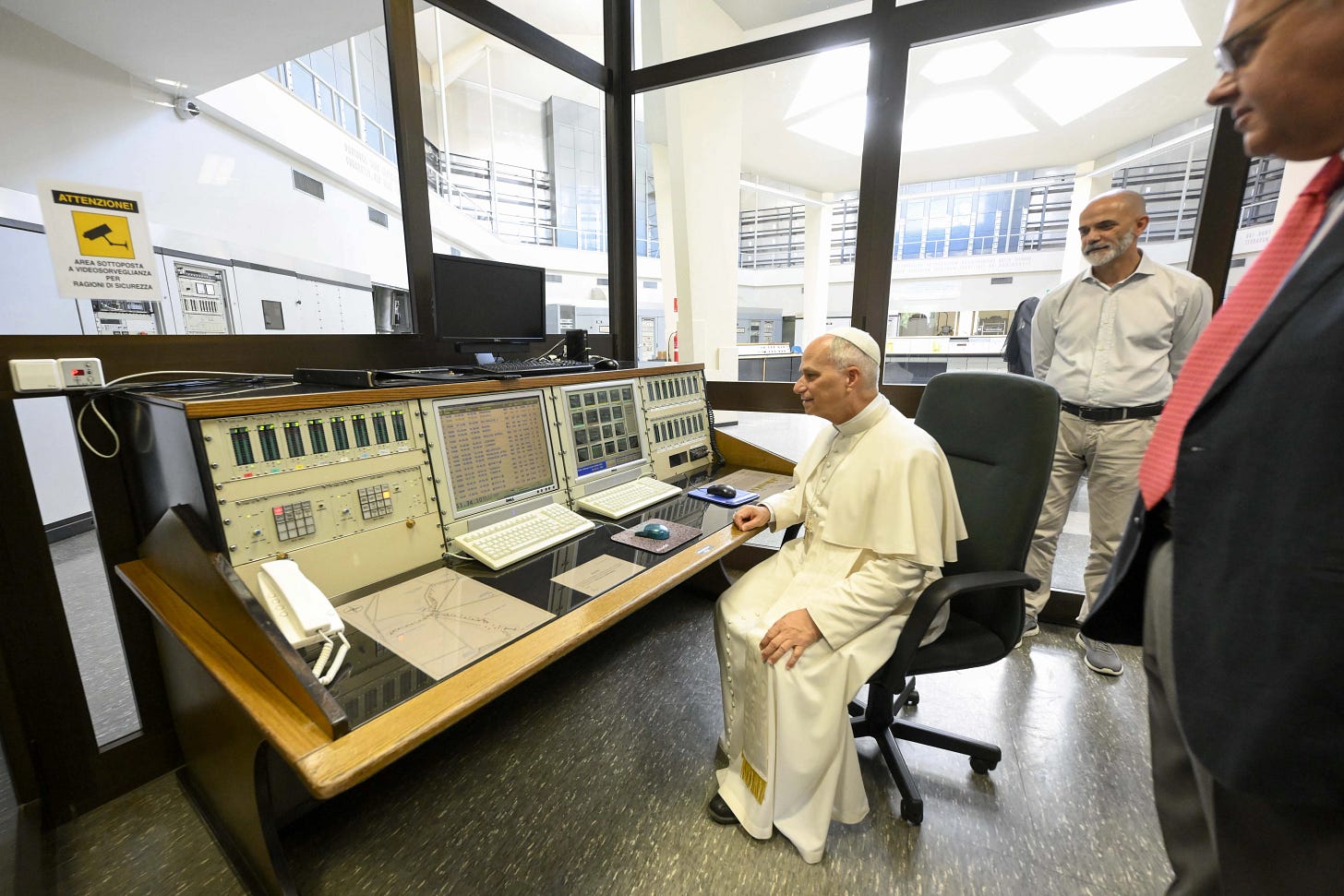Pope Leo XIV on AI: Don't Become a Machine
A glimpse into the core issue of his pontificate
Pope Leo just met with AI researchers at the Vatican and gave us another glimpse into what many predict will be a core issue of his pontificate:
Artificial Intelligence
Pope Leo took his name after Leo XIII.
Leo XIII reigned during the Industrial Revolution, and Pope Leo recognized that we’re at the dawn of a new Industrial Revolution with the rise of artificial intelligence.
He told AI researchers that research into artificial intelligence needs to be “a profound ecclesiastical endeavor,” as opposed to merely an economic or a scientific one.
What does that mean?
When Everything Becomes Its Own God
As our society becomes more secular, more separated from the Christian idea of all things being focused towards Christ, we have made idols out of power, money, and progress.
The scientist advances technology for its own sake. The economist grows his wealth. The politician increases his power for its own sake. A person’s job becomes their god and that god is to be pursued at all costs. And in the process, we lose what makes us human.
All of these professions have found a golden calf in artificial intelligence. It will help scientists progress faster, businessmen make more money, and politicians track us more efficiently.
Pope Francis wrote that with new AI technologies, we risk “eclipsing what is human.” (Antiqua et Nova, 9.) AI reduces people to numbers, just cogs in a machine, which is exactly what happened in the first Industrial Revolution. People were seen as widgets on an assembly line.
People suffered.
We’re about to see the same thing with artificial intelligence.
On the other hand, when we lean into what makes us human—family, community, creativity—we care less about scientific progress. We need less of what the corporations and politicians are selling. When we are more human, we have more power.
Be More Human
Years ago, during COVID, my podcast listeners developed a slogan: Be More Human.
During the pandemic, we felt ourselves becoming robots. Everything was virtual. Everyone’s hobby became “content” (and therefore about making money.) Everyone was either working or scrolling. We all felt like machines.
Now, with the rise of artificial intelligence and robots acting like human beings, we risk human beings becoming like machines again.
But we are not machines. Machines don’t live forever. You and I have immortal souls. We’re capable of love, of justice, of sin.
The core principle of “Be More Human” was an intentional effort to engage in things that only human beings can do: Build relationships, be creative, grow families, pray.
A robot can’t do that.
Increasingly, the Church is becoming the last bastion of what is human. Pope Leo XIV sees this. He’s calling AI researchers to remember that technology must serve human flourishing, not replace it.
In an age where robots are trying to do more of what only human beings can do, we need to cling to the things that make us human and reject the robotic from them as much as we can.
The Church is Always Right
The response to this is likely going to be that I’m being a Luddite—a movement of English factory workers who destroyed the machines they believed were threatening their jobs. The Catholic Church is often called “Luddite” when it warns against advances in technology.
But even though the Church gets flak for resisting technology…it’s also been right every single time.
It resisted the abuses of the Industrial Revolution, which killed hundreds of thousands and needed to be reigned in. It resisted hormonal birth control, which turns out to be terrible for your health.
Currently, the Church is pumping the breaks on AI. And people need to listen. Because we’ve been right every single time before.




Good post
I really appreciate this piece. “Be More Human” is exactly the counter-catechesis our moment needs. You’re right that AI can perfect the performance of intimacy without offering the presence of a person. and that’s probably where we can say that idolatry by design creeps in. A genuinely human yardstick for any technology is simple. We can ask, does it help a person attend, understand, judge, and decide more truthfully and freely, or does it harvest attention, flatten judgment, and outsource decision? If it’s the latter, it’s anti-human no matter how impressive it looks. That’s why, as AI enters parish life, we need bright lines. Machines can compose prayers, but only persons pray; machines can draft homily notes, but only a pastor can preach the Word to this people at this altar. No fake sacraments or simulated spiritual authority, clear identity cues (“I’m a tool, not a person”), and automatic hand-offs to human ministers for conscience, grief, and crisis should be non-negotiable.
If we use AI at all in Catholic contexts, let’s bind it to the Magisterium as its “constitution”. That entails retrieval from trusted sources, transparent citations, and a principled refusal to contradict doctrine. Pair that with a practical “Catholic Turing Test” (not to test for consciousness because that impossible in principle) that certifies tools as pastorally safe (honest about limits, non-deceptive, and non-anthropomorphic) rather than pretending to detect souls. And beyond tools, we need formation. Your call to family, community, and creativity is exactly right. I’d add solidarity and subsidiarity as daily disciplines that de-idolize tech, and an invitation for Catholic engineers, educators, and pastors to co-design humane defaults before the market sets them for us. The Church isn’t anti-technology; she’s pro-truth about the human person. Thank you for naming the danger (and the dignity) so clearly. If we keep choosing presence over performance, worship over widgets, and communion over consumption, we won’t just survive the next revolution. We’ll humanize it.